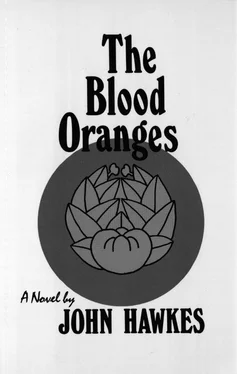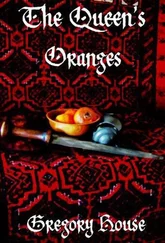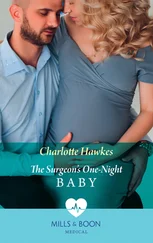Why then this decided sensation of erotic power? Why the implication of some secret design? What brilliant and, so to speak, ravaging guile could possibly be concealed inside that slender and merely partial form? Why did I smile immediately and Fiona cry out in happy recognition at the black hole driven so unaccountably into that small portion of the stone which, realistically, should have revealed no more than sexual silence?
Of course I knew the answers then as I know them now, knew them with as much warm pleasure as I knew them only weeks ago (or days?) when Catherine and I were standing alone in that same sun-filled abandoned place and talking together, contemplating the very same stone figure that had once so mystified my eager friend and aroused my wife. Observing Catherine’s hand on the little sloping stone shoulder and seeing Hugh’s bafflement in Catherine’s eyes and hearing Hugh’s questions in Catherine’s mouth, I could do no more than point out to Catherine that these two situations of discovery were dissimilar and yet similar, while no matter how many times the small pinkish torso gave up its little secret, the actual grace and power of this small figure remained undiminished. Because in the first situation, as I reconstructed it for Catherine, Fiona had verbalized the secret whereas I had relied on demonstration, Fiona putting her arm around Hugh’s waist and explaining in a lighthearted speech that the beautiful stone figure was really a little boy as well as a little girl, I searching about in the grass until I found the missing piece which, when inserted into that large and perfectly round black hole, demonstrated the statue’s double nature already defined in Fiona’s words. And searching in the grass again, at first with no success and then with good luck, once more finding the handy length of polished stone where I had apparently dropped it so long ago, and repeating the demonstration for Catherine, softly I filled in a few more details, recalled a few more instances of forgotten speech, forgotten sensation, describing how Fiona had enjoyed this human toy, had swiftly taken over the demonstration from methodical Cyril and had exclaimed repeatedly that the figure was a girl for Hugh and me but was always a boy, a beautiful little boy, for her. Fiona had been right, as Catherine agreed, and Catherine admitted that she too preferred the missing piece in place and yet understood my sympathy for Hugh who had repeatedly attempted to seize it from Fiona’s hand and yank it out so long ago, so far in the past.
And so it stands in that gentle half-demolished enclosure where three of us once frolicked and later, much later, two of us talked, and where Catherine and I may further contemplate it whenever we wish to view ourselves again in light of the handmaiden and youth combined.
Of course the cistern, with its resemblance to the squat church, and the little pink hermaphrodite, with its obvious resemblance to the yellow and vaguely female figure whose history is still fading high on the interior walls of the squat church, are merely two landmarks perused at random from our inexhaustible supply. There are other examples (the Byzantine grave marker on the beach beyond the pines, the table that still lies overturned in the lemon grove, the bend in a rocky path where I sponged the oil of roses onto Catherine’s soft back, a bed of crab grass) and some are more important, some less. And yet how can we choose, Catherine and I, what difference does it make which kiss we recover, or which single laugh or which faint cry we hear again in silence? The tapestry hangs down, the map is spread, one road is as good as the next.
Love beckons.
IDID NOT KNOW HOW LONG I HAD BEEN STANDING THERE with hands in pockets, legs crossed at the ankles, left shoulder slowly and heavily inclining against the flimsy and yet tightly fastened shutters, but I was quite aware of Hugh’s persistent silence and of the obvious fact that if I wished to open the shutters, as indeed I did, I had only to flip the hasp and give them an easy push with a finger or two. Still I waited, keeping my back to Hugh and preferring not to unfasten the shutters but only to lean against them with increasing pressure. I smelled the canal that lay outside at the back of the wall, I heard Hugh rattling his photographic equipment, I heard a solitary pigeon strutting above our heads on the roof. And I dismissed the sound of a liquid chemical slopping into one of his developing pans, I ignored Hugh’s silence, I asked myself what I was doing here with Hugh when I might just as well be embracing Catherine behind our favorite oleander tree. But then shoulder and shutters crossed some kind of threshold so that thanks to no apparent volition of mine they burst open, those ancient tightly secured shutters, and swung back on the light, the gray water, the stone embankment, the rusted body of the old motorbus now the color of red lead.
But I knew full well why I was here with Hugh, knew what Fiona wanted and what was coming, and perhaps should have been more ready than I was to enlist Hugh’s agony in dialogue. And yet I waited, allowing myself to wonder what had become of the woman I had once seen waving from this window where now I leaned, allowing myself to wonder again why the pitted and rusted vehicle down there in the water was more real, so to speak, than the one I remembered. But the lonely pigeon fell into view for a moment, Hugh moaned.
“What’s the matter,” I heard myself saying. “Something wrong?”
“I’m sweating, boy, can’t you see?”
“Chest again?”
“No, boy, it’s not my chest.”
“Well then,” I said, and paused. “How about Fiona?”
“Fiona?”
“Sure,” I said mildly. “Why not?”
“God, boy. Do you know what’s happening?”
“Let’s talk about it.”
But would I be able to bear down on Hugh’s problem? Could Hugh be comforted? He had not selected this room for nothing, it seemed to me, and I could not have been more aware of sagging floor, wet plaster, the crude and heavy bench covered with tin pans, blind cameras. Even the photographs scattered here and there on the white walls were stuck to the rancid plaster with thick and rusted nails that were more appropriate to beams, coffins, heavy planks, than to the glossy and curling enlargements of nude girls. And everything about Hugh himself bore out the nature of his purpose, the extent of his self-created pain, his determination to infect this hour, this day, our two lives and more with his despair. How could I miss the acid stains on the long and skimpy cotton shirt that clung to his chest? How miss the gray discolorations on his long cheeks, the beads of sweat in curling beard and knifelike mustache? How miss the black sailor pants on one side left unbuttoned from loin to waist? Or the fact that he had not even bothered to fasten the left sleeve with the usual safety pin, so that below what should have been the elbow there was merely the empty sleeve, the ghost unheeded but nonetheless in his way? How miss his eyes, his height, his agitation? And against all this I had only patience, tolerance, my systematic personality, Fiona’s silent prompting, the sun at my back. Was it enough?
“You just don’t know what’s going on. That’s all.”
“Do you?”
“I’m appealing to you, boy. Don’t let it happen.”
“Well,” I said slowly, “you’ve had your eye on Fiona since the beginning. Let’s reason from there.”
“She’s got a husband.”
“You’ve got a wife.”
“I’m talking about you, boy, not me.”
“And the torment,” I said and paused, “yours or mine?”
“You don’t know what’s going on in the shadows, boy. That’s all.”
“Tell me.”
“If we don’t work together, if we don’t stop this thing, you’ll lose her.”
Читать дальше












